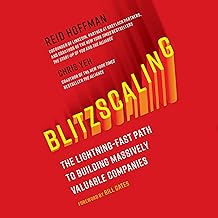
The Bogleheads' Guide to Investing
Mel Lindauer , Taylor Larimore , et al.
4.7 on Amazon
11 HN comments

Who
Geoff Smart and Randy Street
4.5 on Amazon
11 HN comments

The Lean Product Playbook: How to Innovate with Minimum Viable Products and Rapid Customer Feedback
Dan Olsen
4.7 on Amazon
10 HN comments

Tribal Leadership: Leveraging Natural Groups to Build a Thriving Organization
Dave Logan , John King, et al.
4.6 on Amazon
10 HN comments

The Big Picture: How to Use Data Visualization to Make Better Decisions―Faster
Steve Wexler
5 on Amazon
10 HN comments

New Sales. Simplified.: The Essential Handbook for Prospecting and New Business Development
Mike Weinberg
4.7 on Amazon
9 HN comments

The Outsiders: Eight Unconventional CEOs and Their Radically Rational Blueprint for Success
William N. Thorndike
4.6 on Amazon
9 HN comments

Sprint: How to Solve Big Problems and Test New Ideas in Just Five Days
Jake Knapp
4.7 on Amazon
9 HN comments

The Making of a Manager: What to Do When Everyone Looks to You
Julie Zhuo
4.6 on Amazon
8 HN comments

The Psychology of Money: Timeless Lessons on Wealth, Greed, and Happiness
Morgan Housel, Chris Hill, et al.
4.7 on Amazon
8 HN comments

TED Talks: The Official TED Guide to Public Speaking
Chris Anderson
4.6 on Amazon
7 HN comments

Beating the Street
Peter Lynch and John Rothchild
4.6 on Amazon
7 HN comments

Red Notice: A True Story of High Finance, Murder, and One Man's Fight for Justice
Bill Browder
4.8 on Amazon
7 HN comments

Blitzscaling: The Lightning-Fast Path to Building Massively Valuable Companies
Reid Hoffman, Chris Yeh, et al.
4.5 on Amazon
7 HN comments

Getting Past No: Negotiating in Difficult Situations
William Ury
4.6 on Amazon
7 HN comments
phyalowonJuly 22, 2016
2. More Money than God - Sebastian Mallaby
3. Dark Pools - Scott Patterson
dantleonNov 14, 2010
awtonJune 30, 2008
dave1619onNov 30, 2014
I think though the main point of my previous comment was that many people (including posts that suggest everyone invest in only low-cost index funds and bonds) tend to underestimate the vast potential of huge returns in investing if one truly is an expert in investing.
Also, I suggest reading Common Stocks, Uncommon Profits by Philip Fisher and also Beating the Street by Peter Lynch. Both books are from legendary investors and will shed light that is different than the index fund approach/philosophy.
WalterBrightonDec 31, 2017
Analysts are paid a lot to get this right. There are a number of ways to figure this out. I read, for example, of analysts counting cars in store parking lots. Peter Lynch of Magellan Fund fame talks a lot about getting this information via proxies in his book "Beating The Street".
If you follow corporate earnings reports, you'll often see the stock drop on seeing a report of good earnings that exceeded expectations. This is because the analysts got a whiff of a stink coming from the company that their long term prospects weren't so good.
If the corporation is larger, there is a LOT of money (billions of dollars) riding on correctly predicting future performance, and analysts who can figure it out get paid accordingly.
It's just not plausible that CEOs can routinely and easily fool these guys.
dave1619onNov 8, 2014
Again, I generally agree with the advice of going with low-cost index funds for the vast majority of people. However, I do think that there are some people (albeit not many) with the right background, skills, training and commitment who can consistently beat the markets (ie., this was the thesis of Peter Lynch's book Beating the Street).
va_coderonApr 28, 2010
http://www.washingtonpost.com/wp-dyn/content/article/2008/08...
Without Fannie and Freddie and the backing by the US taxpayer Wall Street would not have taken as much risk.